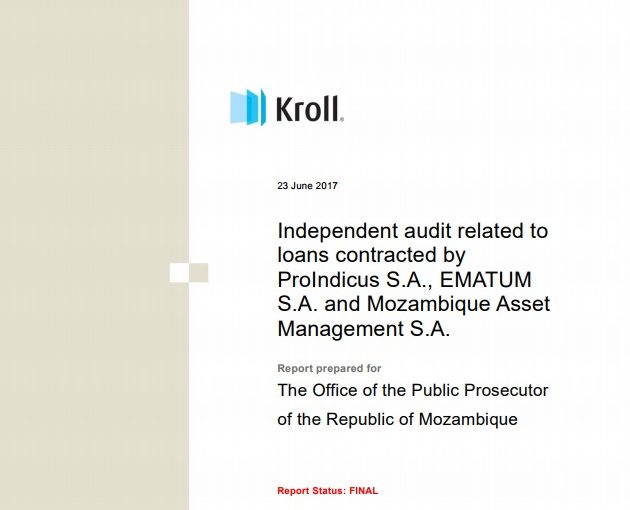Mozambique: 2024 series banknote, coin production cost €46.9M - central bank
Kroll report: Companies did not cooperate with audit – AIM

File photo
The three Mozambican security-related companies, Ematum (Mozambique Tuna Company), Proindicus and MAM (Mozambique Asset Management), audited by the London branch of the firm Kroll Associates, failed to cooperate fully with the auditors.
The executive summary of the Kroll audit report, published on Saturday by the Attorney-General’s Office, states that the three companies, which used illicit government guarantees to acquire over two billion dollars in loans from European banks, only provided “limited financial data, including incomplete trial balances and bank statements for certain periods, and incomplete supporting documentation, such as loan facility agreements and supplier contracts. As a result, it became apparent that a significant amount of the information originally envisaged to be held by the Mozambique Companies in Mozambique was not available”.
Since the three companies were unable, or unwilling, to provide the complete bank account information requested by Kroll, the auditors had to go to the banks. Via the Bank of Mozambique, it requested “details of local Mozambique bank accounts held by the Mozambique Companies. These requests included bank statements and, where relevant, supporting documents for certain transactions”.
Kroll hoped to identify all international transactions involving the three Companies, the Contractor (the Lebanon-based Privinvest group), and other entities linked to Privinvest.
But even the banks failed to cooperate fully. Kroll said that, by the time of submitting its report, it had not received responses from all Mozambican banks, “and issues have been identified regarding the effectiveness of search criteria applied by certain local Mozambique banks”.
“As a result”, it added, “Kroll cannot rely on the completeness of this information for the purposes of this report”.
Kroll points out that its audit depended on receiving complete documentation from the three companies, from the government officials who approved the guarantees, from the banks that gave the loans (Credit Suisse and VTB of Russia) and from Privinvest.
But the information was not all forthcoming. “It should be noted”, Kroll says, “that, in reaching the conclusions set out in this report, Kroll has not had access to full and complete documentation, including internal confidential documents of the parties involved, nor has it met with all key personnel of the parties involved. The main challenge in completing the Independent Audit was the lack of documentation available from the Mozambique Companies. Kroll spent a considerable amount of time requesting and liaising with representatives of the Mozambique Companies to obtain documentation and information that was, in some cases, either ultimately incomplete or not provided at all.”
Thus, despite the importance given to the audit by the government, and despite the fact that normal relations with the International Monetary Fund (IMF), and other international partners can only resume after the audit is published, the management of Ematum. Proindicus and MAM did not cooperate with the auditors.
Sometimes the companies claimed they could not provide answer because the information was “classified”. Thus the company management hid behind the weary excuse of “national security”. Much of this obstruction was pointless because Kroll could turn to other sources. It requested documentation “from Credit Suisse and VTB regarding the loan agreements, from the Contractor regarding the supply contracts, as well as other various government departments and third parties for other relevant documentation”
Kroll found that the three companies “appear to be inadequately managed, are not fully operational, have generated no meaningful revenues, and have no contracts in place to provide future revenues”.
The business plans and feasibility studies claimed that the companies “were expected to generate combined operating revenues of USD 2.3 billion by December 2016”. But these projections verged on the fantastic. Kroll remarked that “at the time of reporting, negligible revenue has been generated and the Mozambique Companies can only meet debt obligations and operational expenses with the financial support of either shareholders, the Ministry of Finance or the Contractor”.
“It is not known when, or indeed, if, the Mozambique Project (that is, the maritime security project that the three companies are supposed to support) will become fully operational, but it appears that this would require considerable financial investment”, Kroll says. “Even assuming that the Mozambique Project could be operationalised, it is not known when profits might be realized”.
The audit found major shortcomings in management namely “in meeting contractual obligations and in establishing the local infrastructure required to enable the Contractor to deliver the intended assets and services, as well as a failure to undertake the required actions necessary to ensure the Mozambique Projects could operate as planned”.
Nothing seemed to be in place to allow the companies to operate as planned. “ProIndicus does not have an operational satellite package”, Kroll found. “Ematum does not currently have permits for the fishing vessels; and MAM has only recently obtained access to a shipyard in Maputo that is undergoing an upgrade to enable the maintenance of vessels”.
This caused headaches for Privinvest which showed Kroll hundreds of emails and minutes of meetings, illustrating the difficulties it had faced in relations with the three companies. Thus Proindicus provided trainees who did not have the necessary skills, qualifications or technical knowledge to attend the courses in operating the interceptor speedboats, and did not even have adequate clothing for the training.
As for Ematum, the company had not even secured the necessary land and buildings to equip the coordination centre planned under the contract with Privinvest.
This “apparent mismanagement” Kroll said, contributed to delays, but Kroll “cannot ascertain the impact of these delays on the overall pricing of the project without further information from the Contractor”.
- The full executive summary may be found at the PGR website: www.pgr.gov.mz












Leave a Reply
Be the First to Comment!
You must be logged in to post a comment.
You must be logged in to post a comment.